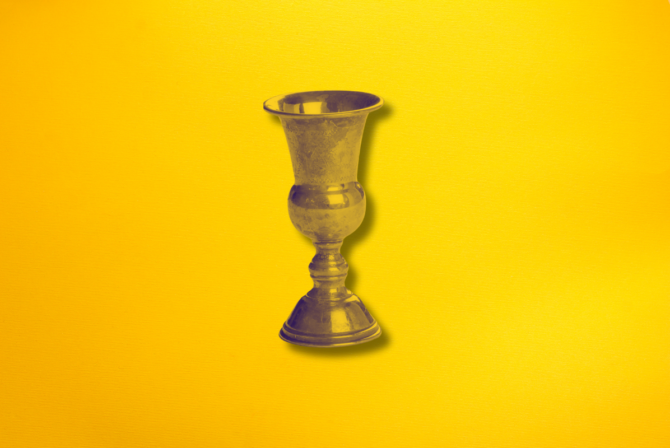This post is part of our Torah commentary series. This Shabbat we read Parashat Pekudei. To read a summary of the portion and learn more, click here.
I have to say right away that my daughter is not boring. She’s a little strawberry-blond spitfire who cracks me up with her sense of humor, amazes me with her expanding grasp of language, keeps me on my toes, and regularly blows my mind.
But still. We’re not exactly peers; it’s hard to find activities to equally entertain a 22-month-old and a 37-year-old. Mommy and Me is cool, and we’re both into baking, but there are only so many sing-a-longs you can attend in a day, and if I bake chocolate chip cookies four times a week I’ll never fit into my clothes again. So on our longer days together, a certain amount of boredom inevitably ensues. Sylvie gets bored when I take too long in the grocery store bulk aisle. I get bored pushing her on the swings. She gets bored when I do dishes. I get bored singing “Old Macdonald Had a Farm” (again). And so on.
Boredom is generally considered a bad thing. And I can’t say it feels particularly good. But recently I have been experimenting with seeing it as a spiritual teacher rather than an enemy.
And in fact, the sort of boredom I feel after a few hours at home alone with Sylvie is eerily similar to what I’ve experienced on the three meditation retreats I’ve attended. It’s an uncomfortable feeling, and oh so tempting to check my email or clean the kitchen or read a magazine or…do anything, really, except face it. But if I can resist that urge, on the other side of boredom I occasionally find a flash of something profound: the feeling of being rather than doing.
With all due respect to our sacred foundational text, I have a feeling this week’s Torah portion has inspired its own share of boredom at first reading. Pekudei is a straight-up description of the construction of the mobile sanctuary where the Israelites worshipped God in the desert. A brief excerpt for your enjoyment:
“In the first month of the second year, on the first of the month, the Tabernacle was set up. Moses set up the Tabernacle, placing its sockets, setting up its planks, inserting its bars, and erecting its posts. He spread the tent over the Tabernacle, placing the covering of the tent on top of it — just as the Lord had commanded Moses.”
Dying to hear more? I admit, on the surface, this seems about as entertaining as a Coleman tent manual. But if you read the whole portion closely, you realize the structure being built in this week’s portion actually must have been stunningly gorgeous, especially in a desert setting: blue, purple, and crimson cloths; bells of pure gold; woodworking; holy anointing oil; and magnificent priestly clothes complete with precious stones.
Like a stripped-down Notre Dame, or a 64-year-old woman swimming from Cuba to Florida, the
mishkan
must have been an example of the transcendence that can happen when hours and hours of human energy and repetitive tasks are devoted to a single purpose.
Although it feels like I’m not getting anything done during those long afternoons with Sylvie, that’s actually not true. I recently heard a tragic NPR spot about Romanian orphans who were raised without any loving adults; as they grew into adults, these orphans continued to have significantly less-than-average brain activity during regular interactions, and scientists now think that normal human infant development actually requires consistent attention from caring adults. That seems intuitive, but hearing it in scientific language made me suddenly conscious of those in-between moments with Sylvie, how each one adds up to the relationship she’s developing with the world. Building yet another tower of Duplos, I’m showing her she is loved. During snail-paced walks around the block, I’m letting her learn skills on her own while keeping her safe. And fifteen minutes into swing-pushing at the playground…well, I’m not sure exactly what’s being accomplished, but I know it’s part of something important.
Whether it’s cutting stone, dying wool, carving wood, sticking with a practice, training for the Olympics, or just building towers of cardboard blocks with a two year old, the moment-to-moment work of creating something magnificent can be boring. It almost has to be boring. Making something awe-inspiring takes time, practice, failure, and perseverance. As parents, that’s the job description. Day after day, hour after unglamorous hour, we get to be part of forming the most magnificent, transcendent creation of all: a human being. Yes, I’m talking about our kids. But I’m also talking about us. As they grow into bigger kids and eventually adults, hopefully we continue to grow into more fully realized humans. Hour by hour, through the high points and the boredom alike, we are building something magnificent.
To read the previous posts in our Torah MOMentary series, click here.
Like this post? Get the best of Kveller delivered straight to your inbox.









